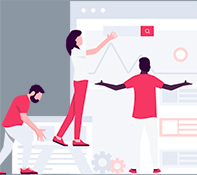

Internet of Things
Deze cursus gaat over de technische kant van informatica en heeft het ‘internet of things’ als toepassingscasus. We bekijken de verwerking van data uit sensoren en het aansturen van apparaten vanuit de computer. Er is daardoor ook een link met de robotica.
De cursus bestaat uit twee delen. Het eerste richt zich op de datacommunictie, zoals in sensornetwerken, het tweede richt zich meer op aansturing. Hoewel de cursus nu als één geheel in het programma staat, is het de bedoeling dat cursisten zich vanaf januari 2019 voor beide delen apart kunnen inschrijven.
Inhoud
The internet of things (IoT) is a computing concept that describes the idea of everyday physical objects being connected to the internet. With the internet of things, the physical world is becoming one big information system. Wireless Sensor Networks (WSN) are like the eyes and ears of the Internet of Things. Advances in sensor technology, low power electronics and low-power wireless devices have enabled the development of cheap, small, low-power sensor nodes, integrating sensing, processing and wireless communication capabilities. Embedding millions of sensors into an environment creates a digital skin or wireless network of sensors. These massively distributed sensor networks, communicate with one another and summarize the immense amount of low-level information to produce data representative of the overall environment. From collaboration between (large) groups of sensor nodes, intelligent behaviour can emerge that surpasses the limited capabilities of individual sensor nodes.
While it is fairly easy to sketch advanced IoT applications, it is not straightforward to realize these in a cost-effective manner. Relevant background topics are: distributed systems (architecture and protocols), networked systems, and resource management.
After completing the course, students are able to:
- understand the technological aspects of IoT and WSN;
- describe and underline the principles of some well-established protocols (e.g. networking, distributed data management);
- present relevant literature to an audience of high school students.
The course is composed of two half-day meetings in Utrecht and a whole day practical course at University of Twente. Students will construct a WSN and present a research paper to the group.
Voorkennis
Basic programming skills, preferably C++ or C++like language.

